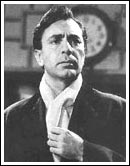
HOME | MOVIES | FEEDBACK |

Dinesh Raheja
Balraj Sahni was an actor in a league of his own. For the well-educated Sahni, evolving as a performer and human being was more important than cultivating an image or wooing stardom. Aesthetic satisfaction rather than monetary emoluments motivated him. This rare quality backed by prodiguous talent made him an icon, notwithstanding the fact that he never really fit into the idiom of the regular hero. Yudhisthir Sahni, rechristened Balraj Sahni for the screen, was born in Rawalpindi May 1, 1913. With a Masters degree in English literature and a Bachelors degree in Hindi, Sahni had an independent bent of mind that goes with high creativity. He taught English and Hindi at Rabindranath Tagore's Shantiniketan. He also did a stint with the BBC in London as a radio announcer for its Hindi service. But the creative fires raged within the man who had an aptitude for the performing arts. Consequently, Balraj Sahni was one of the pioneers of IPTA (Indian People's Theatre Association). Amongst the many plays, his work in the Abbas-penned Zubeida, and The Inspector General are notable. Later, even after he became a star in the 1960s, Sahni initiated the Art Theatre Group.
Sahni was launched as a film actor in K Abbas's offbeat Dharti Ke Lal (1946). The film gave vent to the feelings of dispossessed peasants. Sahni's wife Damyanti also worked with him in the film but she, unfortunately, did not live to see Sahni's subsequent success. She passed away in 1947. After two years, Sahni married his cousin, Santosh. In 1951, Sahni worked with major stars like Dilip Kumar and Nargis for the first time in K Asif's Hulchul. During the making of the film, Sahni was arrested for his leftist leanings and K Asif had to take special permission from the court for Balraj Sahni to shoot, albeit under police escort. In the same year, Sahni, who considered himself a writer first, wrote the story and dialogue of Guru Dutt's Dev Anand-Geeta Bali starrer, Baazi. The crime-musical was a smash hit. But Sahni's refusal to kowtow to box-office parameters and his uncompromising nature as a writer --- he made Guru Dutt wait for six months before he delivered the leather-bound script of Baazi --- ensured that he was largely offered work as an actor. Especially after Zia Sarhadi's Hum Log (1951), where his courtroom speech in the climax became one of the major draws of the film. While Hum Log gave him the patina of an actor, Sahni got the star-actor sheen with Bimal Roy's ground-breaking epic, Do Bigha Zameen (1953). To get into the skin of his character of a farmer-turned-rickshaw driver, Sahni bought a gamcha to wrap around his head and plied a rickshaw on the streets of Kolkata for two weeks with his son Parikshit and daughter Shabnam sitting on it. This willingness to immerse himself into the role stayed with him even in latter years: he lived with the Kabuliwalas to prepare for the title role of Kabuliwala (1961). Sahni's ability to communicate his characters' hapless despair in Do Bigha Zameen has remained forever in many cinegoers' psyches. Veteran actor Ashok Kumar too was totally bowled over by Sahni's interpretation of the role of Shambhu, a peasant who leaves no stone unturned to save his land from the cold clutches of industrialisation. At 40, Sahni finally become one of the foremost talents in Hindi films.
One of the earliest and staunchest subscribers of neo-realistic cinema, Sahni subsequently worked in films like Garam Coat (1955), an offbeat story of a postal clerk who hankers after a decent winter coat. While working in films like Do Roti and Heera Moti (based on a story by Munshi Premchand), Sahni made his bow as a director with Lal Batti (1957), an experimental suspense thriller. Commercially, the film went out like a light during a power failure. Simultaneously, Sahni also worked in more mainstraeam fare. His pairing with Nutan in sensitive films like Seema (1955) and Sone Ki Chidiya (1958) was well liked. After Seema, Sahni was showered with accolades for his serene turn as reformist while he played a radical poet with admirable restraint in Sone Ki Chidiya. Sahni now worked opposite A-list heroines like Nargis (Lajwanti), Meena Kumari (Chaand) and Vyjayanthimala (Kathputli). Even as Sahni became busy as an actor, he continued to carry his typewriter to his sets, and contributed regularly to Nai Kahani, a Hindi magazine edited by his brother Bhishm Sahni. He also penned poems, stories and an autobiography Meri Filmi Aatmakatha.
Sahni's success story in cinema continued into the 1960s with films like Kabuliwala and Haqeequat. In Haqeequat (1964) which was set in Ladakh against the backdrop of the Indo-China 1962 war, Sahni gave a stirring performance as an officer who inspires his batallion. Sahni now seamlessly moved onto character roles. However, his contribution continued to be vital --- whether it was Lala Kedarnath, the earthquake victim of Waqt (1965), the childless husband of Ek Phool Do Mali (1969) or Dilip Kumar's foe in Sangharsh. One of Sahni's last films, Garam Hawa, was another testimony to the immense stature of the versatile actor, who was accorded the Padmashri a few years before his untimely death. In this M S Sathyu film, Sahni played a respectable Muslim shoemaker Salim Mirza, who considers forsaking his ancestral business and home in the wake of the partition of India. But in a last minute show of spirit, Mirza, prompted by his son, decides to stay back. The performance won Sahni several encomiums. Sahni would have notched many more milestones in his career but the death of his young daughter Shabnam left him hearbroken. At the age of 60, Sahni himself succumbed to a heart attack April 13, 1973. You might also want to read: The many avatars of Rajesh Khanna
|
||||||||||
© 1996 - 2002 rediff.com India Limited. All Rights Reserved. |
|||||||||||